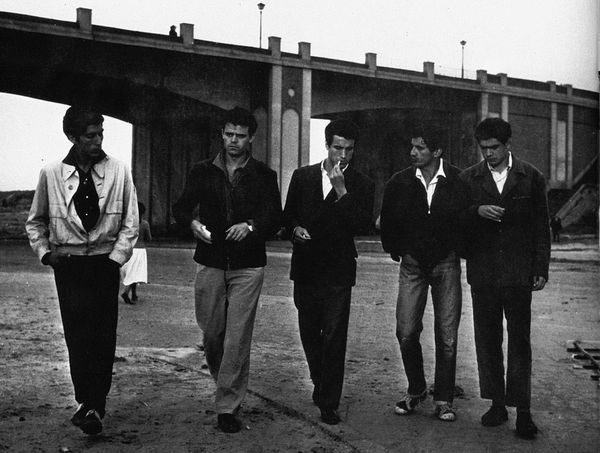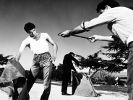Eye For Film >> Movies >> The Delinquents (1960) Film Review
The Delinquents
Reviewed by: Rebecca Naughten

Long unavailable in any home viewing format, when a French DVD of Carlos Saura's directorial debut was finally released last year, Spanish critics bemoaned the quality of the image and Spain's apparent lack of interest in film conservation or restoration. Sadly the print that showed at this year's Viva Film Festival in Manchester was also of poor quality - there were scratches throughout and certain sequences seemed faded - but this was a rare opportunity to see one of Saura's early films with English subtitles.
The film had a difficult start - made in 1959 and in the running for the Palme d'Or in 1960, it wasn't released in Spain until 1962 after a long battle with the censors and more than 10 minutes of footage had been excised. A conscious attempt to break away from the studio-set films of the time, The Delinquents drops us into the street with wide establishing shots emphasising the urban setting, while domestic scenes play out in locations of palpable poverty and degradation. This dreary backdrop builds into an implicit social critique, with the young protagonists fully aware that their social environment limits their prospects and contributes to the aimlessness of their daily lives - becoming 'something' or 'somebody' seems like an unattainable pipe-dream.

The only one of them with a skill that could prove to be their collective ticket out of there is Juan (Oscar Cruz), who shows promise as a bullfighter but is unable to afford the time to train or the exorbitant fee to enter an actual bullfight. The central narrative is that the gang, on the prompting of senior member Ramón (Luís Marín), agree to raise the money for Juan's entrance fee through a series of ever more serious hustles and street robberies. The robberies are carried out stylishly in the chiaroscuro shadows of a moving elevator or with sharp timing and economy of movement in the blazing sun of a parking lot - the latter sequence in particular hints at what Saura would go on to achieve with his third film, the superlative The Hunt (La caza) (1965).
Played by non-actors, there is a naturalness to the gang's interactions with each other that contributes to Saura's presentation of them as 'modern' youths - alongside the preening in the mirror, or the self-conscious straightening of their suits, there is a swagger to their group behaviour that by extension suggests their awareness of their power as a collective as opposed to individuals. They have a group identity based on where they're from but also that of 'youth' more generally, as seen in the sequences in dance halls where they are part of a mass of dancers, and blend into the crowd while trying to pick up girls or drowning their sorrows at the bar.
The fate of this film and his sophomore effort (Lament for a Bandit (Llanto por un bandido) (1963)) at the hands of the Spanish censors drove Saura into the more opaque - or metaphorical - style of cinema with which he made his name internationally in the Sixties and Seventies. Beyond providing that impetus for a different style, there is not much in The Delinquents that obviously connects to his later works besides a questioning of Spanish mythology (via the bullfighting in this case) and a nascent interest in dance.
But while there are better examples of Spanish realist cinema contemporaneous with the period - Juan Antonio Bardem's Death Of A Cyclist (Muerte de un ciclista) (1959) springs to mind - The Delinquents is nonetheless of interest as the starting point in the career of a director who would persistently and consistently challenge the censors during the dictatorship and who has continued to march to the beat of his own drum in the years since. Carlos Saura is currently in pre-production on his 38th film.
Reviewed on: 19 Mar 2014















